Introduction: The Vital Link Between Brain, Heart, and Mushrooms
The exploration of natural compounds that nourish both cognitive function and cardiovascular health has gained increasing momentum in the fields of neuroscience and integrative medicine. Among the most intriguing discoveries in recent years is the potential role of functional fungi—particularly nootropic mushrooms—in supporting the health of two of the body’s most vital organs: the brain and the heart. These mushrooms, long revered in traditional medicine systems and increasingly studied in modern research, offer a dual-action promise of neuroprotective and cardioprotective benefits. In this context, the best nootropic mushrooms for heart health emerge as compelling candidates for those seeking science-backed, plant-based strategies for holistic well-being.
This article dives into the fascinating synergy between nootropic mushrooms and cardiovascular function, examining seven powerful varieties that have shown potential in enhancing memory, reducing cognitive decline, and supporting healthy heart rhythms, blood pressure, and vascular integrity. Drawing on research from neuroscience, cardiology, and ethnobotany, we offer an in-depth, evidence-informed guide to the top nootropic mushrooms that may foster both mental clarity and cardiovascular resilience.
You may also like: The Ultimate Guide to the Best Nootropic Mushrooms for Memory and Cognitive Enhancement
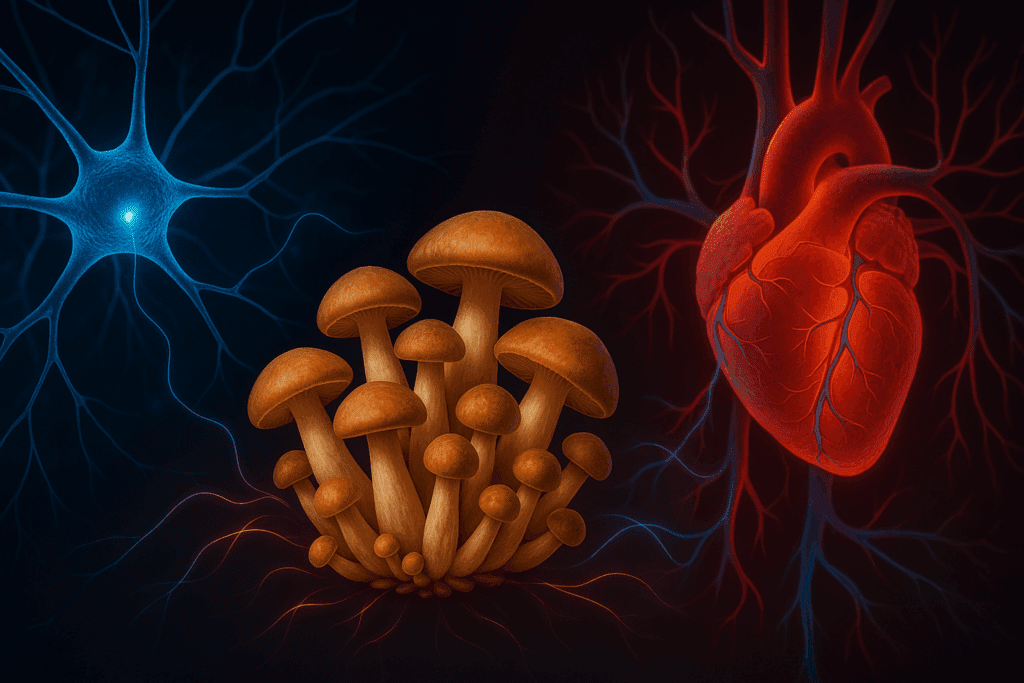
Understanding Nootropic Mushrooms: What Sets Them Apart
To appreciate the significance of these fungi, it’s important first to understand what distinguishes nootropic mushrooms from other types. The term “nootropic” refers to compounds that support cognitive function, particularly memory, focus, creativity, and motivation, without causing harmful side effects or dependence. While many synthetic nootropics exist, a growing body of interest surrounds natural nootropics, including specific mushrooms with adaptogenic, antioxidant, and neuroregenerative properties.
What sets nootropic mushrooms apart is their complex biochemistry. Unlike culinary mushrooms used merely for flavor or texture, these functional varieties are rich in bioactive compounds such as hericenones, erinacines, polysaccharides, beta-glucans, terpenoids, and ergothioneine. These substances interact with key physiological pathways to modulate inflammation, improve blood flow, enhance neurogenesis, and protect cells from oxidative damage—factors that influence both cognitive longevity and cardiovascular efficiency.
In addition, many of these mushrooms have been used for centuries in Eastern medical traditions, such as Traditional Chinese Medicine (TCM) and Ayurveda, for treating ailments that we now recognize as linked to inflammation, stress, and circulation. The convergence of traditional knowledge and contemporary science offers a compelling foundation for exploring how mushrooms for heart health can play a transformative role in preventive medicine.
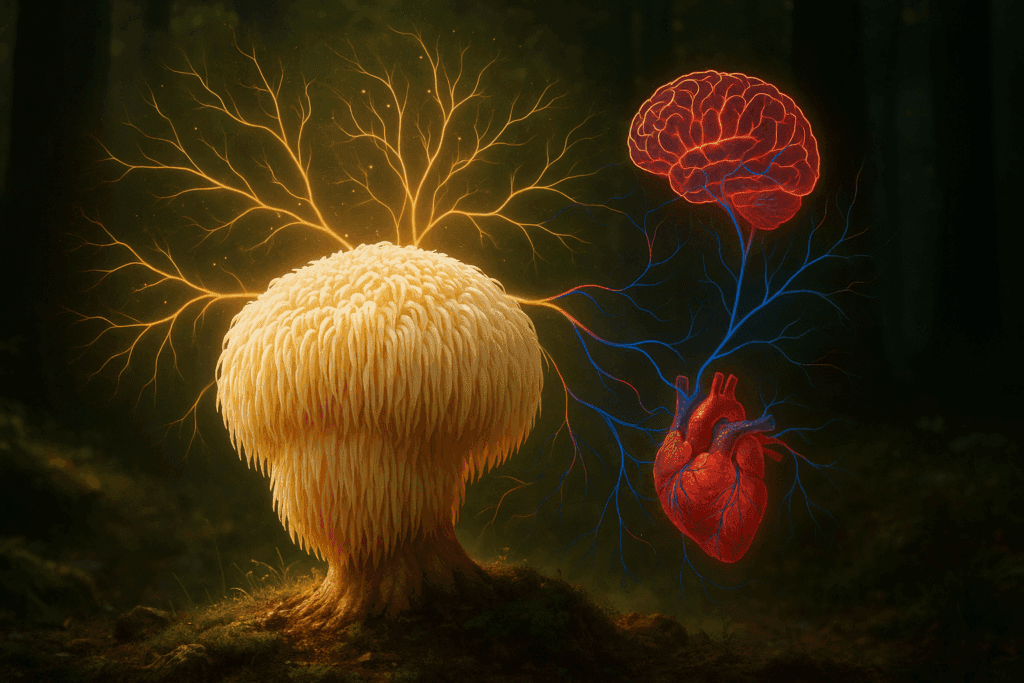
Lion’s Mane: Enhancing Cognitive Vitality and Cardiovascular Integrity
One of the most studied and widely acclaimed nootropic mushrooms is Hericium erinaceus, more commonly known as Lion’s Mane. This mushroom is easily recognized by its cascading white spines and is celebrated for its ability to support neurogenesis—the growth and repair of nerve cells. The key bioactive compounds in Lion’s Mane, hericenones and erinacines, have been shown to stimulate the production of nerve growth factor (NGF), a protein essential for the survival and maintenance of neurons.
Beyond its brain-boosting effects, Lion’s Mane may also support cardiovascular health. Preliminary research indicates that it can help regulate lipid profiles, potentially lowering levels of LDL (bad cholesterol) while boosting HDL (good cholesterol). Moreover, its antioxidant properties may reduce oxidative stress in blood vessels, contributing to improved endothelial function and arterial flexibility. These factors are especially important in preventing atherosclerosis and promoting smooth blood flow to the brain and heart.
In addition, Lion’s Mane has shown promise in modulating autonomic nervous system responses, reducing stress-induced spikes in heart rate and blood pressure. For individuals seeking the best mushrooms for heart health with added cognitive benefits, Lion’s Mane offers a compelling and multifaceted solution that bridges mental and physical wellness.

Reishi: The Calming Guardian of Mind and Heart
Ganoderma lucidum, commonly known as Reishi, is often called the “mushroom of immortality” in Traditional Chinese Medicine, and for good reason. Revered for its adaptogenic and immune-modulating properties, Reishi has long been used to manage stress, enhance sleep quality, and improve energy levels. What makes Reishi particularly valuable among the best nootropic mushrooms for heart health is its remarkable ability to influence both mental equilibrium and cardiovascular regulation.
Reishi contains triterpenoids, ganoderic acids, and polysaccharides that collectively exert anti-inflammatory, antioxidant, and anxiolytic effects. These compounds help reduce systemic inflammation, which is a known contributor to both neurodegenerative conditions and cardiovascular diseases. By mitigating chronic stress and dampening the physiological impact of cortisol, Reishi supports heart rate variability and parasympathetic nervous system dominance, which are critical indicators of heart resilience.
Furthermore, studies have shown that Reishi may lower blood pressure and improve circulation by enhancing nitric oxide synthesis, which relaxes and dilates blood vessels. It has also demonstrated potential in reducing platelet aggregation, thereby lowering the risk of clot formation and stroke. In essence, Reishi supports a serene mind while fostering a strong, well-regulated cardiovascular system, making it a standout among mushrooms for heart health.

Cordyceps: Energizing Oxygen Flow and Cognitive Endurance
Cordyceps militaris and Cordyceps sinensis are parasitic fungi that have captivated scientists for their profound effects on energy metabolism, oxygen utilization, and athletic performance. Traditionally used in Tibetan and Chinese medicine to treat fatigue and respiratory ailments, Cordyceps is now gaining recognition as a potent nootropic and cardiovascular enhancer.
The key compounds in Cordyceps, including cordycepin and adenosine, have been shown to improve mitochondrial efficiency, enhance ATP (adenosine triphosphate) production, and support oxygen uptake. These effects are not only beneficial for physical stamina but also critical for maintaining mental alertness and focus, especially in high-demand environments.
From a cardiovascular perspective, Cordyceps may help regulate blood pressure and improve cardiac output. Its ability to enhance vasodilation and improve endothelial function contributes to better blood circulation, including cerebral perfusion. Research has also indicated potential lipid-lowering effects, particularly in reducing triglyceride levels. These combined benefits make Cordyceps one of the best mushrooms for heart health and cognitive performance, especially for individuals facing fatigue, stress, or age-related decline.
Chaga: The Antioxidant Powerhouse Supporting Neurovascular Health
Inonotus obliquus, or Chaga, is a fungus that primarily grows on birch trees in cold climates and has been traditionally used in Siberian folk medicine as a general health tonic. Often referred to as the “king of medicinal mushrooms,” Chaga is rich in antioxidants, including melanin, polyphenols, superoxide dismutase (SOD), and betulinic acid, making it a powerful ally against oxidative stress.
Chaga’s potential as a nootropic lies in its capacity to protect neuronal tissues from oxidative damage, a key factor in aging and neurodegeneration. Antioxidants in Chaga may help preserve the integrity of neuronal membranes and improve cellular communication, contributing to enhanced memory and focus. Its anti-inflammatory properties also support neuroplasticity and cerebral vascular health.
In terms of cardiovascular function, Chaga offers multiple benefits. Its antioxidant profile supports the health of blood vessels, reduces LDL oxidation, and improves cholesterol ratios. By lowering systemic inflammation, Chaga can ease the burden on the heart and reduce the risk of developing hypertension and atherosclerosis. These effects highlight Chaga’s relevance among the best mushrooms for heart health, particularly in populations vulnerable to oxidative stress and metabolic disorders.
Turkey Tail: Immune Intelligence for Brain and Heart Harmony
Trametes versicolor, commonly known as Turkey Tail, is a colorful, fan-shaped mushroom known for its immune-modulating effects. Rich in polysaccharide-K (PSK) and polysaccharopeptide (PSP), Turkey Tail has been extensively researched for its ability to support immune function and enhance the body’s response to pathogens and inflammation.
While Turkey Tail is not traditionally categorized as a nootropic, emerging studies suggest that its role in immune modulation and gut health can indirectly support brain and cardiovascular function. The gut-brain-heart axis is increasingly recognized as a critical framework in understanding holistic health, and Turkey Tail plays a meaningful role in balancing this triad.
By improving gut microbiota diversity and reducing inflammation, Turkey Tail supports a stable immune environment, which is essential for cognitive function and vascular health. Inflammation in the gut has been linked to neuroinflammation and atherosclerosis, making Turkey Tail’s effects particularly relevant. This mushroom’s influence on systemic immunity and inflammation contributes to its standing among the best nootropic mushrooms for heart health, especially when considered through the lens of whole-body homeostasis.
Shiitake: Culinary Delight with Cardioprotective and Cognitive Benefits
Lentinula edodes, better known as Shiitake, is widely consumed around the world for its rich umami flavor and nutritional density. Beyond its culinary appeal, Shiitake possesses significant medicinal properties that enhance both cognitive and cardiovascular well-being. Key compounds in Shiitake include lentinan, eritadenine, and beta-glucans, which contribute to its immune-boosting, cholesterol-lowering, and neuroprotective effects.
Shiitake’s role in brain health stems from its content of B vitamins, zinc, and selenium—micronutrients that support neurotransmitter synthesis and antioxidant defense. Regular consumption of Shiitake may enhance mental clarity, reduce cognitive fatigue, and support overall brain resilience, especially in aging populations.
From a cardiovascular standpoint, eritadenine is particularly notable for its ability to modulate lipid metabolism. Studies have shown that Shiitake can help reduce serum cholesterol levels, improve arterial elasticity, and support endothelial function. These effects make Shiitake not only a delicious dietary addition but also a worthy candidate among mushrooms for heart health. Its accessibility and broad culinary use further enhance its practicality as a functional food.
Maitake: Balancing Blood Sugar and Brain Chemistry
Grifola frondosa, or Maitake, is another functional mushroom with a long history of use in traditional Japanese and Chinese medicine. Known as the “dancing mushroom,” Maitake has earned attention for its role in regulating blood sugar levels, supporting immune function, and improving metabolic resilience. These effects have significant implications for both cognitive and cardiovascular health.
The beta-glucans in Maitake help modulate immune responses and reduce chronic inflammation, while its ability to enhance insulin sensitivity supports stable blood glucose levels. This is particularly important because chronic hyperglycemia has been linked to both vascular damage and neurodegenerative conditions such as Alzheimer’s disease.
Moreover, Maitake’s polysaccharides may support neurochemical balance by influencing serotonin and dopamine pathways. Improved glycemic control and neurotransmitter stability can enhance mood, memory, and overall mental performance. From a cardiovascular perspective, Maitake has demonstrated potential in reducing blood pressure, lowering LDL cholesterol, and improving vascular tone, solidifying its place among the best mushrooms for heart health with cognitive co-benefits.
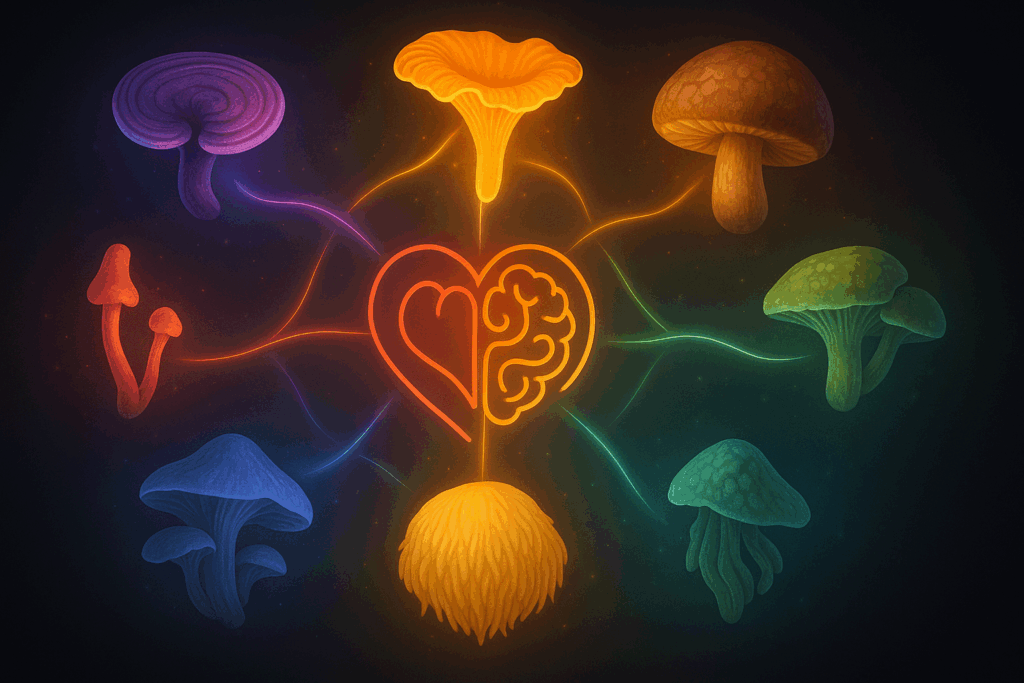
How the Best Nootropic Mushrooms for Heart Health Work Together Synergistically
While each of the aforementioned mushrooms offers distinct benefits, combining them may yield synergistic effects that amplify their overall impact. This concept of synergy is well-supported in botanical and nutritional sciences, where whole-plant or whole-food combinations often outperform isolated compounds. For example, combining Reishi and Cordyceps may simultaneously calm the nervous system and boost energy metabolism, creating a balanced state of alert relaxation. Similarly, the antioxidant power of Chaga can complement the neuroregenerative effects of Lion’s Mane, enhancing both cognitive function and vascular protection.
Formulations that include multiple nootropic mushrooms for heart health can target various physiological pathways simultaneously—from improving mitochondrial function and regulating blood pressure to enhancing neuroplasticity and modulating stress responses. Such multi-targeted strategies may be particularly valuable for aging individuals, those with metabolic syndrome, or anyone seeking preventive interventions rooted in natural medicine. As always, it’s important to consult healthcare providers when introducing new supplements, especially for individuals with pre-existing conditions or those taking medications.
Choosing and Using Functional Mushrooms Wisely
Selecting high-quality mushroom supplements is essential to reaping their full benefits. Due to the growing popularity of nootropic and adaptogenic mushrooms, the market is now saturated with products of varying purity and potency. When choosing supplements, look for those that are certified organic, tested for contaminants, and contain fruiting body extracts rather than mycelium on grain, which tends to be less potent. Dual-extraction methods, which use both alcohol and hot water, are considered the gold standard for unlocking the full spectrum of bioactive compounds.
Dosage and timing also matter. For example, Lion’s Mane and Cordyceps are best taken in the morning or early afternoon to support mental clarity and physical vitality. In contrast, Reishi is better suited for evening use due to its calming effects. Functional mushrooms can be consumed as capsules, tinctures, teas, or powders mixed into smoothies and other beverages. Long-term consistency tends to yield the best results, as many of these benefits accrue over weeks or months of regular use.
Integrating these mushrooms into a broader wellness routine that includes a nutrient-rich diet, regular physical activity, stress management, and quality sleep will further enhance their effects. Rather than viewing them as magic bullets, it is best to approach them as part of a holistic approach to brain and heart health, aligned with lifestyle choices grounded in scientific insight and ancestral wisdom.
Integrating Nootropic Mushrooms into Daily Wellness Practices
Beyond individual supplementation, one of the most promising approaches to maximizing the benefits of nootropic mushrooms lies in their integration into broader wellness practices. These fungi can be seamlessly woven into daily routines, complementing existing habits aimed at promoting mental and cardiovascular health. For example, morning rituals such as meditation, breathwork, or journaling can be enhanced with the energizing and focus-enhancing properties of Cordyceps or Lion’s Mane. By establishing a rhythm of intentional use, users often report improved mental clarity and sustained energy levels throughout the day.
In culinary applications, mushrooms like Shiitake and Maitake are particularly versatile, easily incorporated into soups, stews, and sautés. These whole-food preparations preserve the beneficial compounds while offering a nutrient-dense alternative to processed ingredients. Incorporating mushrooms for heart health into meals also enables synergistic interactions with other cardioprotective foods such as leafy greens, garlic, olive oil, and fatty fish rich in omega-3 fatty acids. When consumed together, these components support anti-inflammatory pathways and vascular health in a comprehensive, food-first strategy.
Moreover, tea infusions made with dried Reishi or Chaga provide a gentle, restorative end to the day. Such beverages, rich in antioxidants and calming compounds, may help regulate circadian rhythms and promote restorative sleep—critical pillars for cognitive and cardiovascular function. By aligning these natural remedies with personalized lifestyle patterns, individuals can enhance their physiological resilience and make wellness a sustainable, enjoyable part of daily life.
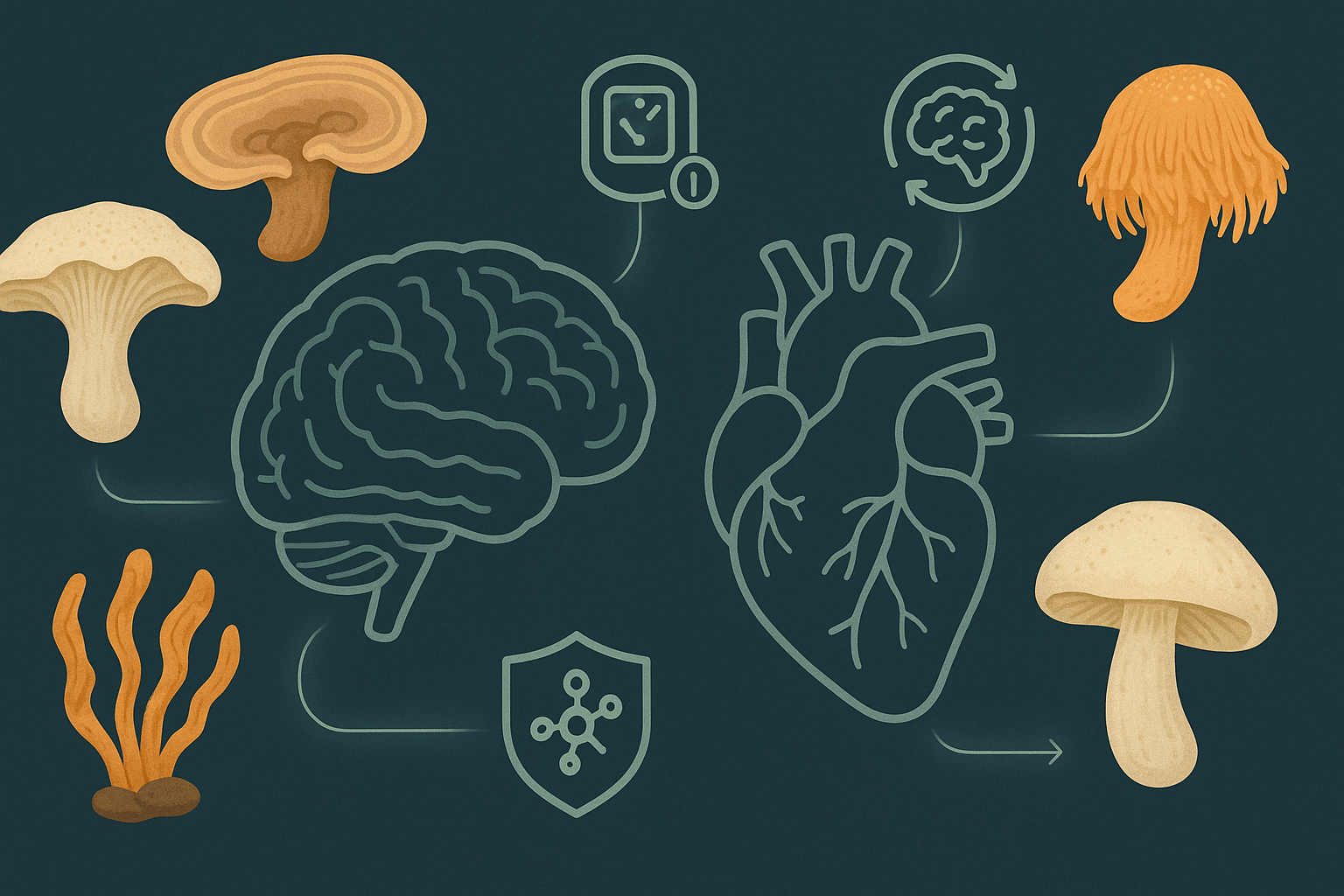
Scientific Research Behind the Best Nootropic Mushrooms for Heart Health
The intersection of ethnomedicine and modern science has produced a growing body of clinical and preclinical studies validating the efficacy of nootropic mushrooms. In the context of cardiovascular health, researchers have turned their attention to the ability of these mushrooms to regulate blood pressure, improve lipid profiles, and reduce endothelial dysfunction. For instance, a randomized controlled trial investigating the effects of Reishi extract on hypertensive patients demonstrated a modest but significant reduction in systolic and diastolic blood pressure after eight weeks of supplementation. The authors attributed this to Reishi’s capacity to enhance nitric oxide bioavailability and reduce vascular inflammation.
Another important area of study involves the neuroprotective effects of Lion’s Mane. Animal models of Alzheimer’s disease have shown that supplementation with hericenones and erinacines can stimulate neurogenesis, reduce beta-amyloid plaque formation, and improve learning and memory performance. These findings support the traditional use of Lion’s Mane as a cognitive enhancer and suggest its potential as a preventive intervention for age-related neurodegenerative disorders.
Chaga and Turkey Tail have been extensively studied for their immunomodulatory effects, with implications for both cardiovascular health and neuroinflammation. The beta-glucans found in these fungi appear to upregulate innate immune responses while simultaneously dampening excessive inflammatory cytokine production. Given the strong link between chronic inflammation and vascular disease, these findings reinforce the role of functional mushrooms in mitigating systemic health burdens. As ongoing clinical trials expand our understanding, nootropic mushrooms are increasingly viewed not as fringe supplements, but as legitimate therapeutic tools within integrative medicine.
Addressing Safety, Dosage, and Contraindications
While the benefits of nootropic mushrooms are numerous, their safe and informed use is paramount. As with any supplement, understanding proper dosage, potential side effects, and contraindications is essential for maximizing benefits while minimizing risk. Most functional mushrooms have an excellent safety profile when used appropriately, with few reported adverse effects. However, individual responses can vary based on factors such as age, genetics, underlying health conditions, and concurrent medications.
For example, Reishi, despite its calming effects, may cause mild digestive discomfort or dry mouth in sensitive individuals when taken in high doses. Cordyceps, known for its energizing properties, should be used with caution by those with uncontrolled hypertension or arrhythmias, as its impact on cardiovascular tone can be pronounced. Additionally, mushrooms like Maitake that influence blood sugar may require monitoring in individuals taking insulin or hypoglycemic agents to avoid unexpected drops in glucose levels.
Dosage ranges typically vary based on the preparation form and extract concentration. A standard Lion’s Mane extract, for example, may be effective in the range of 500 to 1,000 milligrams per day, while a concentrated Reishi tincture might require only 1 to 2 milliliters. It’s also important to note that dual-extracted formulations often contain higher concentrations of active compounds, necessitating careful adherence to label instructions. Consulting a qualified healthcare provider, particularly one familiar with herbal and integrative approaches, is advisable before starting any new supplement regimen, especially for those managing chronic illness or using prescription medications.
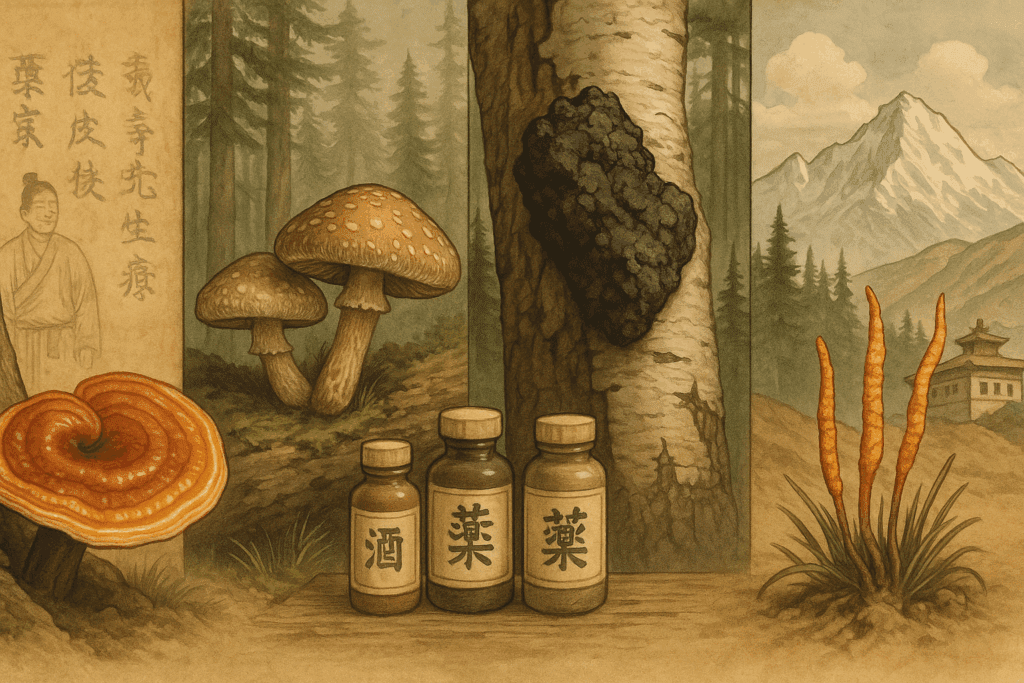
Cultural and Historical Perspectives on Medicinal Mushrooms
The therapeutic use of mushrooms is not a recent phenomenon. In fact, fungi have played a central role in the healing traditions of numerous cultures for millennia. In Traditional Chinese Medicine, Reishi (Lingzhi) was reserved for royalty and regarded as a symbol of longevity, spiritual potency, and cosmic balance. Ancient herbal texts, such as the Shen Nong Ben Cao Jing, list Reishi as a superior tonic for the mind, heart, and spirit. Similarly, in Japanese Kampo medicine, Shiitake has long been valued for its ability to invigorate the blood and enhance energy flow, concepts that parallel modern understandings of circulatory health and metabolic support.
Indigenous cultures across Siberia and Northern Europe used Chaga as a remedy for gastrointestinal and cardiovascular ailments, brewing it into teas and tinctures that were revered for their strengthening effects. Meanwhile, in the high-altitude regions of Tibet and Nepal, Cordyceps was considered so precious that it was used as currency and gifted to emperors. Stories of its revitalizing powers have been passed down through generations, often associated with enhanced stamina, fertility, and mental clarity.
These historical practices reflect an intuitive recognition of mushrooms for heart health long before the advent of biochemical assays and clinical trials. Today, as science begins to validate many of these traditional claims, a rich tapestry of cultural wisdom is being rediscovered and respected. This cultural continuity offers a deeper appreciation for nootropic mushrooms, not only as supplements but as holistic tools steeped in the legacy of human connection to the natural world.
Exploring Future Directions: Personalized Mycotherapy and Innovation
As the field of mycology advances, the potential applications of nootropic mushrooms continue to expand. Emerging research in areas like epigenetics, gut-brain axis modulation, and mitochondrial optimization suggests that the impact of these fungi may extend far beyond current understandings. One exciting frontier is the integration of functional mushrooms into personalized medicine. By analyzing individual genetic markers, microbiome composition, and metabolic profiles, future healthcare models may tailor mushroom-based interventions to optimize outcomes for each person.
Biotechnological innovations are also pushing the envelope. Advances in fermentation technology now allow for the cultivation of rare mushroom species at scale, ensuring sustainability while preserving bioactive potency. Synthetic biology techniques may one day enable the custom design of mushroom-derived compounds for targeted therapeutic applications, such as precise modulation of neuroinflammation or arterial plaque regression.
In the consumer health space, companies are beginning to develop sophisticated delivery systems for functional mushrooms, including nanoemulsions, liposomal extracts, and bioenhanced capsules that improve absorption and efficacy. These developments promise to make the benefits of the best nootropic mushrooms for heart health more accessible and impactful than ever before. As interest grows, ongoing collaboration between researchers, traditional healers, and wellness practitioners will be crucial in ensuring that the evolution of mycotherapy remains grounded in integrity, efficacy, and holistic wisdom.
Expert FAQ on the Best Nootropic Mushrooms for Heart Health
1. What makes the best nootropic mushrooms for heart health different from ordinary culinary mushrooms?
Unlike common culinary mushrooms, which are primarily used for flavor and basic nutrition, the best nootropic mushrooms for heart health contain concentrated bioactive compounds that support specific physiological functions. These include compounds like beta-glucans, terpenoids, and ergothioneine, which can influence neurogenesis, vascular tone, and inflammation. Culinary mushrooms may have some overlapping nutrients, but functional mushrooms are often extracted and standardized for therapeutic use. Additionally, the synergy between their neuroprotective and cardioprotective properties makes them unique tools for integrative health strategies. These mushrooms are often used in precision supplementation protocols aimed at optimizing both mental and cardiovascular wellness.
2. Can functional mushrooms like Lion’s Mane or Reishi replace traditional medications for cognitive or heart issues?
Functional mushrooms such as Lion’s Mane and Reishi should not be viewed as direct replacements for prescribed medications, especially in managing diagnosed conditions like heart disease or cognitive disorders. However, they can be valuable as complementary interventions, supporting the body’s natural healing mechanisms and potentially enhancing the efficacy of standard treatments. For instance, Lion’s Mane may help in promoting neurogenesis, while Reishi could aid in stress regulation and blood pressure modulation. Patients considering mushrooms for heart health should always consult with a medical provider to ensure no adverse interactions with existing therapies. These mushrooms are most effective when incorporated as part of a broader, individualized wellness approach.
3. Are there unique benefits of nootropic mushrooms for heart health in aging populations?
Yes, aging populations stand to benefit significantly from the dual-action properties of nootropic mushrooms. As we age, the risk of both cognitive decline and cardiovascular issues increases due to oxidative stress, vascular rigidity, and reduced neuroplasticity. Mushrooms like Chaga and Cordyceps may counter these effects through their antioxidant and mitochondrial-supportive properties. These compounds can help maintain cellular integrity, improve energy metabolism, and preserve endothelial function. Incorporating the best mushrooms for heart health into a daily routine may contribute to longevity and improved quality of life in older adults.
4. How do nootropic mushrooms interact with gut health to support the brain-heart axis?
Emerging research highlights a strong gut-brain-heart connection, and many nootropic mushrooms play a role in nurturing this triad. Turkey Tail, for instance, is rich in prebiotic fibers and polysaccharopeptides that enhance gut microbiota diversity. A healthy gut environment can reduce systemic inflammation, which is a known contributor to both neurodegeneration and cardiovascular disease. By improving gut barrier integrity and microbiome balance, these mushrooms indirectly support neurological function and heart resilience. In this way, mushrooms for heart health operate through a systems biology framework, offering broad-spectrum benefits.
5. Are there any social or psychological benefits associated with long-term use of these mushrooms?
Long-term use of nootropic mushrooms may offer indirect psychological and social advantages by enhancing overall cognitive and emotional well-being. Improved mental clarity and reduced anxiety, often reported with regular use of Reishi or Lion’s Mane, can contribute to better interpersonal relationships and workplace performance. Individuals may also experience heightened motivation and reduced cognitive fatigue, fostering a greater sense of control and optimism. Socially, these benefits can manifest in more confident communication, reduced irritability, and increased resilience to stress. Over time, this improved psychological profile supports better heart rate variability, linking back to cardiovascular health.
6. What are some advanced ways to incorporate these mushrooms beyond supplements?
While capsules and tinctures are common, there are many creative and advanced methods to integrate the best nootropic mushrooms for heart health into daily life. For instance, functional beverages infused with dual-extracted Lion’s Mane or Cordyceps can be consumed in place of coffee for a stimulating yet balanced boost. Adaptogenic cooking using mushroom powders in soups, broths, or smoothie bowls can offer culinary diversity and bioavailability. Topical formulations, although less explored, are beginning to emerge for localized antioxidant support. Another innovative avenue is the integration of nootropic mushrooms into personalized nootropic stacks, paired with nutrients like magnesium L-threonate or L-theanine for enhanced absorption and synergy.
7. How do climate and cultivation methods affect the potency of mushrooms for heart health?
Environmental factors such as altitude, soil composition, and climate significantly influence the phytochemical richness of nootropic mushrooms. Wild-harvested Reishi from high-altitude forests tends to have higher concentrations of triterpenoids compared to commercially cultivated varieties. Similarly, Lion’s Mane grown on natural hardwood substrates often yields superior hericenone content. Cultivation techniques, including dual extraction and fermentation, also play a key role in preserving and enhancing bioavailability. When selecting products, consumers should seek transparency in sourcing and extraction methods to ensure they receive the best mushrooms for heart health with maximum potency.
8. What trends are emerging in clinical research around nootropic mushrooms and cardiovascular health?
Recent trends in clinical research reveal growing interest in the cardiovascular applications of nootropic mushrooms, particularly around blood pressure modulation, endothelial repair, and inflammation reduction. Scientists are also exploring synergistic effects with conventional medications and nutraceuticals to amplify therapeutic outcomes. Studies on ergothioneine, a rare amino acid found in mushrooms, show promise in protecting vascular tissues from oxidative stress. Additionally, researchers are investigating the preventive role of mushrooms in metabolic syndrome—a precursor to heart disease. This evolving evidence base will likely inform future clinical guidelines around using mushrooms for heart health in integrative care models.
9. What challenges do people face when sourcing quality nootropic mushrooms?
A major challenge lies in the vast variability of product quality and labeling standards. Many mushroom supplements contain myceliated grain rather than fruiting bodies, leading to significantly reduced concentrations of active compounds. Additionally, non-organic sources may contain pesticide residues or heavy metals, undermining the health benefits. Consumers must also navigate confusing terminology and marketing claims that may not reflect clinical efficacy. To ensure the best nootropic mushrooms for heart health, it is essential to choose products with transparent sourcing, dual-extraction processes, and third-party lab verification.
10. Can athletes or high-performers benefit from these mushrooms for both cognitive edge and cardiovascular endurance?
Absolutely, high-performing individuals and athletes can gain substantial benefits from incorporating nootropic mushrooms into their training and recovery protocols. Cordyceps, in particular, enhances oxygen utilization and ATP production, supporting endurance and faster recovery. Lion’s Mane promotes neuroplasticity and sustained focus, which can improve performance in both physical and mental tasks. Additionally, the anti-inflammatory effects of Chaga and Reishi can reduce post-exercise soreness and support heart rhythm regulation under stress. For those pushing their physical and mental limits, mushrooms for heart health serve as a powerful, natural ally that aligns with peak performance goals.
Conclusion: Embracing the Transformative Potential of Nootropic Mushrooms
In a world increasingly affected by cognitive disorders and cardiovascular disease, the search for safe, natural, and effective interventions has never been more urgent. The best nootropic mushrooms for heart health stand at the crossroads of ancient healing traditions and modern scientific discovery, offering a promising path for individuals seeking comprehensive, plant-based strategies for enhanced vitality. Their unique ability to support neurogenesis, reduce inflammation, balance energy systems, and protect the vascular network makes them not just supplements, but transformative allies in the journey toward whole-body health.
As research continues to explore the nuanced mechanisms through which these fungi interact with human physiology, we are likely to uncover even deeper insights into their therapeutic potential. For now, incorporating mushrooms such as Lion’s Mane, Reishi, Cordyceps, Chaga, Turkey Tail, Shiitake, and Maitake into daily routines represents a thoughtful, evidence-informed step toward optimizing memory, cognitive clarity, and cardiovascular function. With a firm grounding in both tradition and science, these powerful nootropic mushrooms offer not only enhanced performance and resilience but also a profound reconnection to nature’s own pharmacy.
Further Reading :
Exploring Medicinal Mushrooms for Heart Health
Ganoderma lucidum mushroom for the treatment of cardiovascular risk factors
